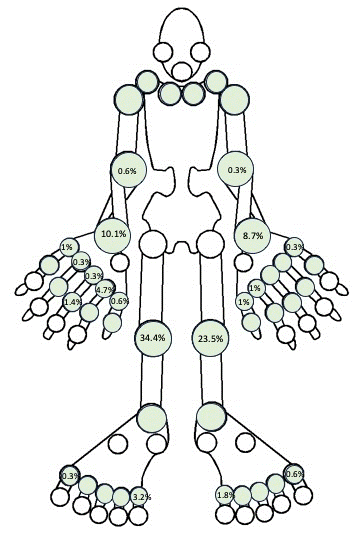Session Information
Session Type: Poster Session C
Session Time: 10:30AM-12:30PM
Background/Purpose: The development of ultrasound-guided synovial biopsy (US-SB) in addition to the knee mini-arthroscopy enabled synovial tissue collection from small and medium joints and facilitated molecular studies. This technique will help to improve the understanding of mechanisms of inflammatory arthropathies as small joints are frequently involved in early arthritis. To assess the safety, tolerability, and feasibility of performing synovial biopsies using a minimally US-SB or a mini arthroscopy in patients suffering from rheumatoid arthritis (RA) in our UCLouvain Brussels arthritis cohort.
Methods: A post-hoc analysis of our arthritis cohort was performed in patients suffering from RA, Undifferentiated arthritis (UA), peripheral Spondyloarthropathies (SA), and osteoarthrosis (OA). The target joints [(knee, wrist, MCP, PIP, MTP] selected for biopsy were analyzed for safety, tolerability, and feasibility. For each patient swelling and tenderness, were determined four weeks after the procedure in the biopsied joint. In addition, the quality of the synovial tissue and total RNA were assessed.
Results: 466 biopsies were reported among patients suffering from RA (N=276, 59.2%), SA (113, 24.2%), UA (N=52, 11.1%), and OA (N=25, 5.3%) performed primarily for research or a clinical indication. Focusing on RA patients the median age at biopsy was 50.7±14.6 years. Figure 1 summarizes the joint biopsy location. Knee biopsies were performed with mini-arthroscopy (N=169, 61.2%) and US-GB for all other joints [wrist (N=53,19%), MCP (N=28,10%), MTP (N=14, 5%), PIP (N=6, 2%) joints, elbow (N=3, 1%) and tenosynovial tissue (N=3, 1%)]. Regarding US-SB, the pre-procedure ultrasound evaluation from a blinded operator confirmed the feasibility of the procedure in 63% of the biopsy-eligible patients identified by clinicians. An intra-articular steroid was administered after 83 (31.3%) of the procedures. No significant increase in pain and swelling was reported. No side effects (including infection, hemorrhage, or tendon rupture) were observed. At the visit (4 weeks) after the procedure, 125 patients (45.3%) did not show tenderness or swelling in the biopsied joint, 26 (9.4%) tenderness, 27 (9.7%) swelling, and 71 (25.7%) both. The positive yield in the total cohort of synovial biopsies was 86% for histological evaluation; in particular, the yield was statistically superior in large joints compared to small joints (120/133, 90.2% versus 69/87,79.3%; p=0.03). Moreover, collected tissue samples were qualitatively adequate for RNA analysis in 92% of cases. Extrapolated data from this cohort, demonstrated that histology can predict treatment response to cDMARDs in early RA (1) and RNA analysis reflects clinical disease activity (2)
Conclusion: Our results over 466 procedures, support the safety and tolerability of both mini-arthroscopy and ultrasound-guided synovial biopsies. We found a good yield for both techniques, while mini-arthroscopy was slightly superior for histological analysis. We confirm that synovial analysis is an useful approach in clinical practice and translational research.
To cite this abstract in AMA style:
Cécile V, Charlotte V, Stéphanie D, Francesco N, triaille C, Emilie S, Stéphanie d, Tatiana S, Aleksandra A, Adrien N, Laurent M, Patrick D. Feasibility, Safety, and Application for Clinical Indication and Research Purposes of Synovial Tissue Analysis in Rheumatoid Arthritis [abstract]. Arthritis Rheumatol. 2024; 76 (suppl 9). https://acrabstracts.org/abstract/feasibility-safety-and-application-for-clinical-indication-and-research-purposes-of-synovial-tissue-analysis-in-rheumatoid-arthritis/. Accessed .« Back to ACR Convergence 2024
ACR Meeting Abstracts - https://acrabstracts.org/abstract/feasibility-safety-and-application-for-clinical-indication-and-research-purposes-of-synovial-tissue-analysis-in-rheumatoid-arthritis/

